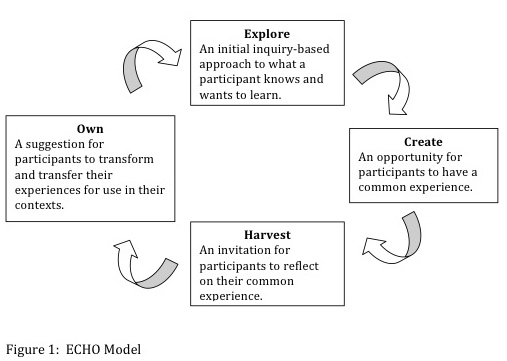As educators we hear and heed Peter McLaren’s warning, “You can’t teach people anything … You have to create a context in which they can analyze themselves and their social formations and lives.” 1 We believe the creation of this context must be our aim as educators, and this context must be balanced between theory and practice. In our pursuit to strike this balance, we believe that experiential education has the potential to assist our fellow educators in transforming their pedagogical practices to more deeply engage their students and improve learning outcomes.
Recently, we were asked to share our meaning of experiential education with an audience of educators. We shared this statement: “Most of life’s great lessons are learned through experience. As educators we have the power to frame and facilitate these experiences for our students to grow, flourish, and reach their full potential.” Part of this statement echoes McLaren, yet other words and concepts from our own experience and learning are also present. Cautiously, we are aware that as we embrace experiential education we must not allow the idea of an educational experience to be dichotomized into the ironic and simplistic mantra that students “learn by doing;” as if any “doing” can be divorced from a cognitive thought processes. John Dewey 2 warned us of this as he noted there must be two sides to learning: the psychological and the sociological.
Experiential education in theory and practice must embrace both sides of learning, including the cognitive and affective domains as well as the social and physical domains. We believe that students can become deeply engaged in their own learning processes through this holistic approach.
To design learning experiences with an experiential approach calls for an application of John Dewey’s ideas 3 of emphasizing the process of education and development by using one’s experiences as the context for any content. Further, he believed that facilitated reflection on those experiences provided the opportunity for growth and transformative learning to occur. The key for Dewey and for any teaching, presumably, is that an individual transfers her/his learning from one experience into the next.
From our experiences of teaching, learning, and working together for more than a decade in traditional classrooms, gorged white-water wilds, forested mountains and the aired sandstone deserts of the southwest we have forged our own ECHO model 4 of experiential education based on an adaptation of Kolb’s “Experiential Learning Cycle.” 5

Ultimately, the real value of any learning experience, be it a classroom lesson or wilderness expedition, comes after the actual experience when the student is able to hear and own her/his own learning and apply it to a new situation. This is an echo: when a professor’s voice or interactive lesson or shared experience returns to serve as a navigation tool for the road ahead.
References:
(1) Singh, A. (2006). The education of a radical in UCLA Today Writer. Vol. 26. No.12 Retrieved April 10, 2008, from http://www.gseis.ucla.edu/faculty/pages/mclaren/
(2) Dewey, J. (1897). My Pedagogic Creed in The School Journal, Volume LIV, Number 3 (January 16, 1897), pages 77-80.
(3) Dewey, J. (1938). Experience and education. New York: Simon & Schuster.
(4) La Prad, J., Mink, A. & O’Steen, B. (2008). Explore, Create, Harvest, Own: An Experiential Approach to Professional Development in The Confluence Proceedings, Adams, L. and Galloway, S., (Eds.). Outdoors New Zealand: Wellington, New Zealand.
(5) Kolb, D. A., (1984). Experiential learning: Experience as the source of learning and development. Englewood Cliffs, NJ: Prentice Hall.
Jim La Prad, an associate professor at Western Illinois University, was named the 2008 National Educator of the Year by the National Society for Experiential Education (NSEE). Andy Mink is Director of Outreach and Education for the Virginia Center for Digital History at the University of Virginia, and the 2003 NSEE National Educator of the Year.
